The 22 men in “trailer 10” work the morning shift at a construction site, then take turns shopping, cooking and cleaning. They pray together. When one returns to India on leave, he carries family presents and cash for the others.
“We all come from the Punjab” in northern India, said Pavinder Singh, a 42-year-old carpenter from the trailer in a camp that houses about 3,000 workers on the desert outskirts of Dubai.
“But what makes us like a family is what we have to endure here together,” he said.

PHOTO: AP
The astonishing building boom in Dubai, which has made it one of the world’s fastest-growing cities, has been fueled by the labor of about 700,000 foreigners — almost all from poor, rural villages in India, Pakistan and Sri Lanka.
The workers’ meager wages still go far in their native lands. Two or three years in Dubai could mean building a house for their family, buying a plot of land or sending children to school. Yet many men escape poverty back home only to find themselves trapped in near servitude here.
Human rights groups have for years decried the harsh conditions of foreign laborers in Dubai, along with the rest of the United Arab Emirates (UAE) and the gulf. But the problem only drew widespread attention after strikes by thousands of workers this year and last.
Some recent protests turned violent — in mid-March, police arrested at least 500 South Asian workers who smashed office windows and set cars ablaze in neighboring Sharjah.
Dubai officials were embarrassed by the bad press. But despite promises of reform, there are still problems.
Many South Asian workers are essentially indentured servants, borrowing heavily to pay recruitment agents for jobs. They can spend several years paying back debts that can run US$3,000 or more with wages ranging from US$150 to US$300 a month. Lately, the laborers have earned less because of a weakened dollar — to which the Emirati dirham is tied — and Dubai’s double-digit inflation.
They work six days or even six and a half, and 60-hour weeks.
Employers often confiscate the workers’ passports, in violation of Dubai law, and withhold pay for two or three months to stop workers from quitting.
Many have no medical insurance and work outdoors in summer heat of 49˚C with stifling humidity.
Housing often means bare, crowded trailers surrounded by barbed wire or located on Dubai’s desert fringes. Some are not connected to water or sewage grids.
Overall, human rights groups say, unscrupulous employers and government indifference have combined to create one of the worst cases of systematic exploitation in today’s world.
Dubai and Emirati officials dismiss talk of a minimum wage as incompatible with Dubai’s market economy. But they insist they have taken steps to ensure regulations are followed at construction sites and living quarters.
“Our role is to make sure that what has been promised is what is actually paid,” said Alex Zalami, a senior adviser to the Emirates’ Labor Ministry. “The companies want to maximize profits. And what we do is teach them that productivity improves, if conditions improve for workers.”
He said a draft labor law soon to go before the Cabinet will allow the government to reject applications for importing workers from companies with a record of violations, force builders to improve conditions or face increased fines, and shut down repeat offenders.
Since January authorities have made firms put workers’ wages in bank accounts that can be monitored. Workers for major building companies have been given ATM cards to collect wages.
But Dubai officials acknowledge they still face several obstacles. One is persuading construction firms to make changes. Another is a shortage of labor inspectors — there are 400 now, almost twice as many as last year but well short of the target of 2,000.
It’s also difficult to build new camps with enough space and hygiene because of soaring land prices, officials say.
Workers can sue in court against employers who miss wages — but it seldom results in payment.
Belberdhas Devadassan said he was happy to be earning money to someday build a house back home. Yet the 23-year-old mason helping build Burj Dubai — already the world’s tallest building — lamented he was away from family in his best years.
“But I have to do this ... If I stay home, I will have no future,” he said. “I plan to be here for another six years and when I am done, I will have what I need.”

UNCERTAINTY: Investors remain worried that trade negotiations with Washington could go poorly, given Trump’s inconsistency on tariffs in his second term, experts said The consumer confidence index this month fell for a ninth consecutive month to its lowest level in 13 months, as global trade uncertainties and tariff risks cloud Taiwan’s economic outlook, a survey released yesterday by National Central University found. The biggest decline came from the timing for stock investments, which plunged 11.82 points to 26.82, underscoring bleak investor confidence, it said. “Although the TAIEX reclaimed the 21,000-point mark after the US and China agreed to bury the hatchet for 90 days, investors remain worried that the situation would turn sour later,” said Dachrahn Wu (吳大任), director of the university’s Research Center for

Alchip Technologies Ltd (世芯), an application-specific integrated circuit (ASIC) designer specializing in artificial-intelligence (AI) chips, yesterday said that small-volume production of 3-nanometer (nm) chips for a key customer is on track to start by the end of this year, dismissing speculation about delays in producing advanced chips. As Alchip is transitioning from 7-nanometer and 5-nanometer process technology to 3 nanometers, investors and shareholders have been closely monitoring whether the company is navigating through such transition smoothly. “We are proceeding well in [building] this generation [of chips]. It appears to me that no revision will be required. We have achieved success in designing

PROJECTION: KGI Financial said that based on its foreign exchange exposure, a NT$0.1 increase in the New Taiwan dollar would negatively impact it by about NT$1.7 billion KGI Financial Holding Co (凱基金控) yesterday said its life insurance arm has increased hedging and adopted other moves to curb the impact of the local currency’s appreciation on its profitability. “It is difficult to accurately depict the hedging costs, which might vary from 7 percent to 40 percent in a single day,” KGI Life Insurance Co (凱基人壽) told an investors’ conference in Taipei. KGI Life, which underpinned 66 percent of the group’s total net income last year, has elevated hedging to 55 to 60 percent, while using a basket of currencies to manage currency volatility, the insurer said. As different

Taiwanese insurers are facing difficult questions about the damage of recent swings in the New Taiwan dollar. Regulators might have a partial solution: letting firms change how they calculate the value of foreign currency assets. The Financial Supervisory Commission (FSC) is considering allowing insurers to use six-month average exchange rates when they calculate risk-based capital in their semiannual reports, a shift from the current system where insurers use exchange rates on the final day of reporting. The change could ease pressure on the US$1.2 trillion insurance sector, whose huge exposure to foreign assets came into the spotlight earlier this month after a